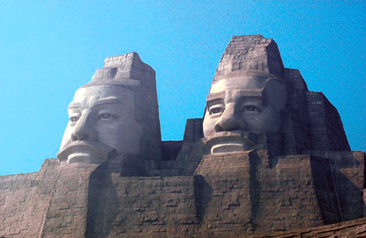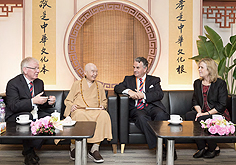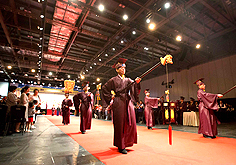
|
 |
Learning “Compilation of Books and Writings on the Important Governing Principles”
Undertaking the Mission to Save the World

| August 4, 2012, Palace of Golden Horses, Kuala Lumpur, Malaysia |
|
|
Traditional Chinese Culture and a Harmonious Society
Education on Raising the Quality of Spiritualityity
 |
Among all people, the Chinese truly understand about education. They understand its intent and its importance. Five thousand years ago our ancestors already said that human nature was originally good and kind. Confucius’ Analects also states this fact. Was this an original statement made by Confucius? No, Confucius merely narrated what he learned from his ancestors. He never made an original statement. Shakyamuni Buddha said the same thing. He said that what he taught us was taught by ancient Buddhas. This “ancient Buddha” is our original self-nature not something outside of us. |
|
| 16 April 2007, Zhengzhou University |
|
|
Practice of “The Standards for Being a Good Student and Child”
Lays the Foundation for Moral Conduct

| October 7, 2006, General Conference Hall, UNESCO Headquarters, Paris |
|
|
The Revival of Traditional Chinese Culture and Education

World Conference on Sinology 2007
Renmin University of China
26 March 2007 |
In the 1970s, the well-known English historian, Professor Arnold Toynbee said that in order to resolve the social problems of the twenty-first century, we must rely on the teachings of Confucius, Mencius, and Mahayana Buddhism. The five thousand yearold Chinese culture is very broad and profound. It encompasses the teachings of Confucianism and Buddhism as well as Taoism. They are not just perfectly compatible; they bring out the best in each other. What is so valuable about the teachings of Confucius, Mencius, and Mahayana Buddhism?
Having studied and learned the sacred teachings for the past fifty-six years and having taught for forty-nine years, from personal experience , I realise that the Way of Confucius and Mencius, and the essence of Mahayana Buddhism are centred on the fact that our intrinsic self-nature is good, kind, and allknowing. |
|
A Society of Harmony and Peace A Homeland of Propriety and Righteousness
A Brief Introduction to the Lujiang Centre of Cultural Education

|
 |
Di Zi Gui - Guide To A Happy Life
Di Zi Gui 《弟子規》 is the ultimate guide to a happy life. For thousand of years, this book contained the recommended standards for students. Even though they seem stringent by today’s standards, it is apparent that the people of that time felt it was important that the child should be well-disciplined and taught moral principles and virtues when still very young.
|
|
 |
Discover the Spirit of Zheng He Inspiration Towards Peace and Prosperity
East Asia Religious Leaders Forum, Remembering Zheng He 600 Years Ago: Cooperation for Peace and Prosperity
Zheng He, the navigator from the fifteenth century, brought Chinese skills and knowledge to benefit people around the world across great distances. At the same time, he spread the peace loving spirit of the Chinese to the five major continents of our world.
|
|

 |
Traditional Chinese Culture's Contribution to the World:
The Ancestral Remembrance Ceremony and Its Significance
2016 UK Ancestral Remembrance Ceremony and Thrice Buddhist Yearning Service for World Peace Speech
Ancestral remembrance is an extremely important part of Eastern culture. The goal is to express our remembrance and gratitude to our ancestors. It seems that Western culture also has something similar. In Hong Kong, every year we organize three large-scale ancestral remembrance ceremonies during Qing Ming festival, the Lunar Mid-Year festival, and the Winter Solstice festival respectively. The goal is to promote filial piety, cherish the memory of our ancestors and to continue the incredible tradition and cultural heritage left behind by the ancient saints and sages. The Analects has a famous saying: “People will become virtuous by respecting life, treating death properly and following their forefather’s teachings.”
|
|
|
|
|
